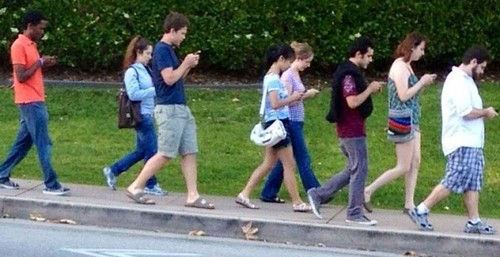Health
Simple Self-Help Tips For Smartphone Addiction

Whichever way you look at it, it’s getting harder by the day to determine what is and is not full-blown smartphone addiction. According to the experts at www.davidgoodlad.co.uk, the definition of addiction is when an individual loses control over any given behaviour and finds they are not able to make changes to their habits, despite trying to do so and wanting to do so. Which makes everything rather difficult to say the least when it comes to smartphone use as we are currently living in an era and as part of a society where staring at a tiny screen all day is pretty much the norm.
But just because it’s the norm, this doesn’t necessarily mean it’s doing any good for us. Far from it, in fact, as a great many studies carried out over recent years have brought to light the very same conclusion – excessive smartphone use can have quite devastating effects on both physical and mental wellbeing alike.

Actually getting any person to fully admit that they have a full-blown smartphone addiction to overcome is never going to be easy. Chances are that even if you yourself are fully aware of the fact that you use your mobile devices a little too much, it’s unlikely that you would say you have a real addiction to address. Which may indeed be the case, but if you have proactively made efforts to cut down on smartphone use and still find yourself compelled to continue regardless…well, this pretty much illustrates the fact that you have somewhat lost control.
So for those who would prefer to take back control of their smartphone habits without necessarily resorting to drastic measures, what follows is a quick overview of just a few helpful tips and tricks from the experts:
- First of all, don’t even think about going ‘cold turkey’ and taking your device completely out of use…you will fail. Instead, approach it a little like you would approach going on a diet, as in establishing goals with regard to when and when you should and should not use your smartphone, in accordance with the time of day. Assign yourself phone-free periods and you’ll quickly realise that you can in fact quite happily live without it.
- Try to get out of the habit of going anywhere near your device when it comes to things like eating with the family, socialising or generally spending time with other people. Even if it is anything but unusual for people to behave in such a way these days, it may as well be you that sets the example by not being quite so ignorant.
- Another extremely easy yet highly effective tip is that of trying to get into the habit of heading to bed each evening without instinctively taking your device with you. Not only does the blue light emitted by smartphones make it more difficult to get to sleep in the first place, but you will also eliminate the temptation to reach out and grab your device every time you wake up in the night.
- Distraction always has been and always will be the key to taking your mind away from something you are trying to cut down on, so why not indulge in healthier activities that don’t involve using your smartphone? There’s really no sense in beginning to list them here as there are literally millions of them – anything that’s good for you and gives you a break from the screen.
- Next time you are out with your friends or family, try setting an example as a role model and seeing if you can get everyone else to ditch their devices for a while. This can be as easy as suggesting that you all take part in a little wager, whereby every one of you places their mobile phones face down on the table and the first person to so much touch their device has to pick up the check. It’s great fun and immediately proves to yourself and everyone else that life can be even more enjoyable without electronic intervention.
- Last but not least, it may sound like a rather extreme measure to those that are well and truly addicted, but to remove all social media apps from your device really can work wonders. The reason being that rather than getting an immediate message each and every time anybody so much as changes their status by a single letter, you will only be able to catch up on what’s happening by proactively logging on and doing so. Suffice to say, you will miss out on a lot of the kind of garbage that’s inconsequential, which isn’t necessarily a bad thing!
-

 Tech11 years ago
Tech11 years agoCreating An e-Commerce Website
-

 Tech11 years ago
Tech11 years agoDesign Template Guidelines For Mobile Apps
-

 Business6 years ago
Business6 years agoWhat Is AdsSupply? A Comprehensive Review
-

 Business10 years ago
Business10 years agoThe Key Types Of Brochure Printing Services
-

 Tech8 years ago
Tech8 years agoWhen To Send Your Bulk Messages?
-

 Tech5 years ago
Tech5 years ago5 Link Building Strategies You Can Apply For Local SEO
-

 Law5 years ago
Law5 years agoHow Can A Divorce Lawyer Help You Get Through Divorce?
-

 Home Improvement6 years ago
Home Improvement6 years agoHоw tо Kеер Antѕ Out оf Yоur Kitсhеn































